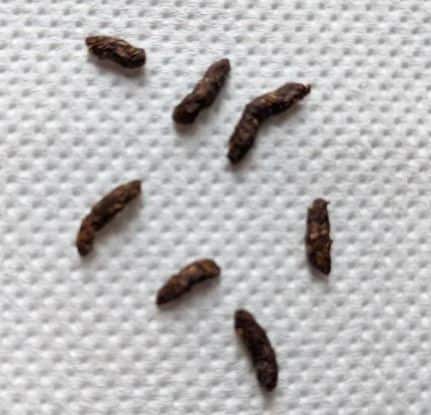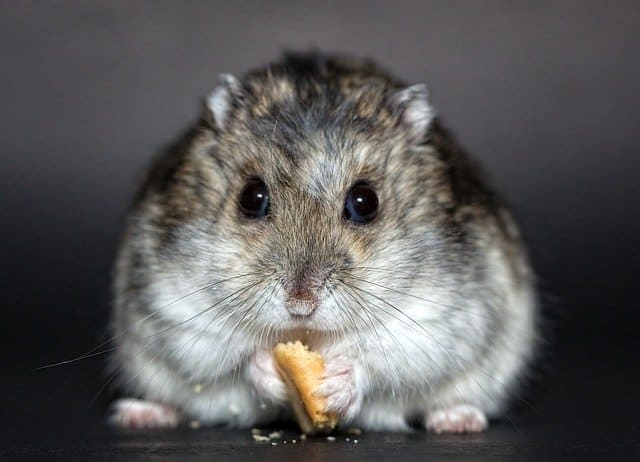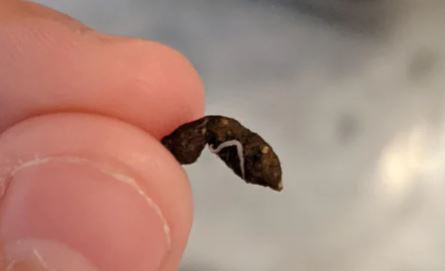The topic “hamster poop” might seem a little bit strange, and more than a little bit gross to some people. However, you’d be surprised how many people have pressing questions about their hamster’s bowel movements. Questions such as what their poop is supposed to look like, what color it should be, how to clean it, and how often these little rodents poop are frequently asked by hamster owners.
Today, we’re going to take a closer look at hamster poop to answer all these pressing questions. If you’re a hamster owner that has questions about your furry friend’s stool, you’ve come to the right place. This guide will answer everything you need to know.
What healthy hamster poop looks like 💩
Healthy hamster poop has the shape of long, oval pellets. They’re small, firm, and typically have a dark brown color. In addition, it should be dry without any strong odors and should not smear.

Their feces are quite distinct and easy to recognize. Furthermore, it’s quite easy to tell whether their poop is healthy or not by looking at the aforementioned description. If you notice that the feces are soft, runny, or light in color it means that something is not right in your hamster’s digestion.
This could be because you’re feeding them too many fruits and vegetables, which can lead to diarrhea because these foods have a very high water content compared to their regular food. Especially fruits and vegetables that consist almost entirely of water such as cucumber and celery can often be responsible for this. If you notice that their poop looks watery or runny and you’ve recently fed your hamster a lot of fresh fruits and veggies make sure that you decrease the amount of fresh produce in their diet. In many cases, this helps to clear up their diarrhea.
If it doesn’t, or if you haven’t fed your hamster a lot of fresh produce, make sure to take your hamster to a veterinarian immediately because they might have something called wet tail which needs treatment.
How often do hamsters poop?
All hamsters poop several times per day, but the exact amount of times that your hamster poops depends on a few factors such as their age, diet, and stress. A good diet, coupled with a low-stress environment is key in ensuring that your hamster has regular, healthy bowel movements.
The impact of their diet

Pooping is simply the process of eliminating waste from the foods that we eat. As such, it’s very logical that your hamster’s diet has a large impact on how often they poop. As I’ve briefly touched upon, giving your hamster too many fresh fruits and veggies can lead to watery, runny poop. Feeding your hamster a well-balanced diet that consists of all the nutrients they need is essential in ensuring that they have healthy bowel movements.
Hamsters are omnivores, which means that they can benefit from eating plants as well as animal-based foods. The ideal diet for a hamster should closely mimic what they eat in the wild: primarily seeds and grains, with smaller quantities of nuts, meat, insects, fruits, and vegetables. Alternatively, some hamster owners opt to replace the seeds and grains with commercial pellets, which is also okay as long as the pellets contain adequate protein (about 16%), fat (~5%), and fiber (10-15%).
Make sure that your hamster gets a well-balanced diet to ensure that they’re able to heavy healthy poops once every few hours.
Older hamsters poop less frequently
Older hamsters poop quite a bit less frequently than youngsters. The primary reason for this is that as hamsters get older, their metabolism slows down. Because of this, they generally eat less food. Eating less food means that they poop less often.
This is nothing to worry about and is completely normal in hamsters as they get older. The same actually happens in many animals and even in humans.
Stress pooping
The final factor that can affect how often your hamster poops is stress. Stress can cause hamsters to poop a lot more than normal. You can frequently see this when you first adopt a hamster into your home. Because they’re not familiar with the environment yet they’re often quite nervous and stressed out. This makes sense because they’re small prey animals and haven’t had time yet to find out whether you’re a threat to them. As a result, they’re often quite stressed which often results in them pooping all over their cage.
This behavior should go away with time as they become more acclimated to their new environment. However, it does sometimes happen that they’re permanently stressed due to an external factor. This can be too much noise, too much light at night, a cat that wanders too close to their enclosure, or, in the case of Syrian hamsters, the smell of another hamster. Syrian hamsters are highly territorial, they only meet to mate. If they meet on other occasions it often results in a fight to the death. If they smell another hamster nearby it naturally results in a lot of stress. Make sure to remove these stress factors to give your hamster the cozy, stress-free life that they deserve.
Do hamsters eat their own poop? 🤔
Yes, hamsters do sometimes eat their poop. This behavior is scientifically known as coprophagy. While it might seem gross to us, it’s actually very normal for hamsters to do so. The reason why they do it is that it’s a way for them to replenish the good bacteria that they excrete. Furthermore, hamsters do not always digest all the nutrients of the foods they eat. By eating their poop they ensure that they get the maximum amount of nutrients from the foods they eat.
Some people oppose this behavior because they think it’s nasty and they want their hamster to stop doing it. However, you will not succeed. Hamsters have gone through millions of years of evolution to eat their own poop because it benefits them. They will not stop just because you want them to. In addition, you wouldn’t be doing them any benefits by trying to make them stop. This is normal, natural behavior for them that they benefit from and is nothing to worry about.
Is hamster poop harmful to humans?
Hamsters are not at high risk for transmitting diseases to humans but you do have to be a little bit careful when handling their poop. Sometimes, hamster poop can contain harmful bacteria such as Salmonella or e. Coli.
In addition, hamsters also quite frequently have parasites. One study done in Turkey revealed that more than half of all hamsters in pet shops there are infected with parasites! This might not be the same all around the world, but it is true that parasites are quite common in hamsters. Not all of these parasites can be transferred to humans, but some can.
Luckily, these harmful bacteria and parasites can be prevented to a great extent by maintaining good sanitary conditions. To minimize the risks of bacteria or parasites from your hamster’s poop follow these guidelines:
- Keep their cage clean. Cleaning your hamsters cage on a regular basis is very important to prevent harmful bacteria from building up. You should scoop out dirty bedding every day, change out all the bedding every week, and deep clean their habitat at least once a month.
- Wash your hands after handling. When handling animals it’s always a good idea to wash your hands with soap after. This will help to prevent the spread of bacteria.
In addition, if you notice that your hamster has parasites in its poop, take it to a vet. They can often be dealt with quite easily. Below you’ll find a picture of what a parasite can look like in your hamster’s feces:

Training your hamster to use a litter box
Hamsters are relatively intelligent animals. Because of that, they’re capable of learning how to use a litter box. It’s highly recommended that you teach them this because it not only makes your job of cleaning their cage much easier, it also helps to prevent offensive odors, and is much more hygienic for them. Luckily, the process of potty training your hamster is quite easy.
First, you’ll need to place a litter box in their enclosure. You can make one yourself or buy one from a pet shop or online. Making one yourself is cheaper, but one that you buy will last much longer.
Once you have your hands on a litter box, teaching your hamster how to use it is quite simple. Just follow these 4 steps:
- Place the litter box in a corner of their cage
- Add some litter to the litter box.
- Grab some litter than your hamster has already pooped on from their cage and move it into the litter box.
- Place your hamster near the litter with poo on it. By doing this, your hamster will be able to associate the litterbox as a place where they can safely release themselves.
If you follow the steps above it shouldn’t take too long for your hamster to start using the litter box. It might not happen immediately, but stay patient, keep putting your hamster in the litter box once in a while and eventually, most hamsters will start using the litter box regularly.
Frequently asked questions
Why is my hamster’s poop green?
Green poop is often caused by your hamster’s diet. Green vegetables are the most likely culprit but it can also be caused by food coloring in certain hamster mixes.
Do you have to clean hamsters’ poop?
Yes, you should scoop out the bedding that they’ve pooped on every day. This is much easier to do when you’ve trained them to use a litter box, which is why it’s recommended to potty train them as soon as possible.
Why do hamsters poop when you hold them?
This sometimes happens when your hamster is stressed or scared by you holding them. It often happens when they’re not fully used to being handled yet or
Why does my hamster poop in its wheel or ball?
There are a few reasons why this can happen. First, they might do it because they want to mark the wheel or ball as “theirs”, so it’s sort of like marking their territory. Alternatively, they might do it because they don’t know any better or because they’re scared.
Final words
There you have it, the complete guide to hamster poop! I hope it answered all your most pressing questions. To recap, healthy hamster feces look like oval-shaped pellets that are dark-brownish in color. They’re firm and dry without any strong odors.
If your hamster has runny, watery poop something is wrong. This can be something as simple as having too many fruits and veggies in their diet but can also be something more serious that needs the attention of a veterinarian.
Hamsters are quite smart and clean animals and teaching them to use a litter box will make it much easier to keep them and their cage fresh and clean!
- How Long Do American Eskimo Dogs Live? Important Factors and Care Tips - September 29, 2023
- Do American Bulldogs Need Grooming? Essential Tips and Care Guidelines - September 29, 2023
- Do Bengal Cats Enjoy Playing? Essential Tips for Keeping Them Active - September 29, 2023